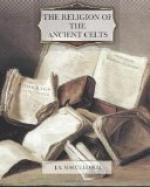Though there is little that is mythological here, it is evident that Pwyll is a god and Rhiannon a goddess, whose early importance, like that of other Celtic goddesses, appears from her name, a corruption of Rigantona, “great queen.” Elsewhere we hear of her magic birds whose song charmed Bran’s companions for seven years, and of her marriage to Manawyddan—an old myth in which Manawyddan may have been Pryderi’s father, while possibly in some other myth Pryderi may have been child of Rigantona and Teyrnon (=Tigernonos, “king").[398] We may postulate an old Rhiannon saga, fragments of which are to be found in the Mabinogi, and there may have been more than one goddess called Rigantona, later fused into one. But in the tales she is merely a queen of old romance.
Pryderi, as has been seen, was despoiled of his swine by Gwydion. They were the gift of Arawn, but in the Triads they seem to have been brought from Annwfn by Pwyll, while Pryderi acted as swineherd.[399] Both Pwyll and Pryderi are thus connected with those myths which told of the bringing of domestic animals from the gods’ land. But since they are certainly gods, associated with the gods’ land, this is perhaps the result of misunderstanding. A poem speaks of the magic cauldron of Pen Annwfn, i.e. Pwyll, and this points to a myth explaining his connection with Annwfn in a different way from the account in the Mabinogi. The poem also tells how Gweir was imprisoned in Caer Sidi (=Annwfn) “through the messenger of Pwyll and Pryderi."[400] They are thus lords of Annwfn, whose swine Gweir (Gwydion) tries to steal. Elsewhere Caer Sidi is associated with Manawyddan and Pryderi, perhaps a reference to their connection as father and son.[401] Thus Pryderi and Pwyll belong to the bright Elysium, and may once have been gods of fertility associated with the under-earth region, which was by no means a world of darkness. Whatever be the meaning of the death of Pryderi at the hands of Gwydion, it is connected with later references to his grave.[402]
A fourth group is that of Beli and his sons, referred to in the Mabinogi of Branwen, where one of them, Caswallawn, usurps the throne, and thus makes Manawyddan, like MacGregor, landless. In the Dream of Maxen, the sons of Beli are Lludd, Caswallawn, Nynnyaw, and Llevelys.[403] Geoffrey calls Beli Heli, and speaks of an earlier king Belinus, at enmity with his brother Brennius.[404] But probably Beli or Heli and Belinus are one and the same, and both represent the earlier god Belenos. Caswellawn becomes Cassivellaunus, opponent of Caesar, but in the Mabinogi he is hostile to the race of Llyr, and this may be connected with whatever underlies Geoffrey’s account of the hostility of Belinus and Brennius (=Bran, son of Llyr), perhaps, like the enmity of the race of D[^o]n to Pryderi, a reminiscence of the strife of rival tribes or of Goidel and Brython.[405] As has been seen, the evidence for regarding Beli as D[^o]n’s consort or the equivalent of Bile is slender. Nor, if he is Belenos, the equivalent of Apollo, is he in any sense a “dark” god. He is regarded as a victorious champion, preserver of his “honey isle” and of the stability of his kingdom, in a Taliesin poem and in the Triads.[406]




